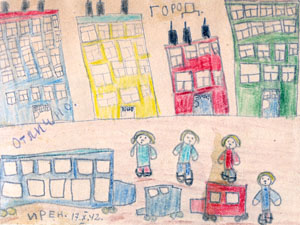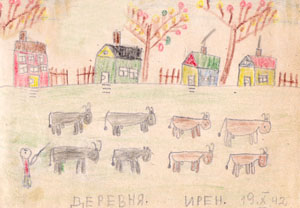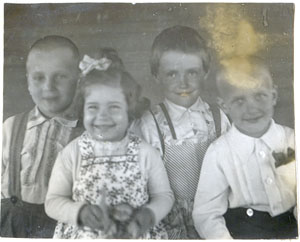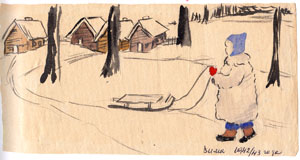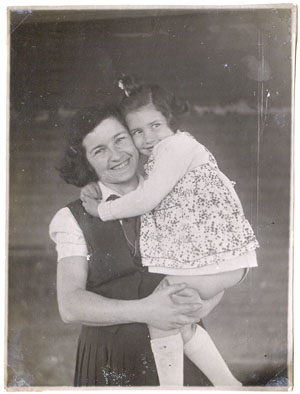
Off to Gorky and to ShavaCHAPTER 7 Iren and I were again on the move, this time to the town of Gorky. There were some of my fellow students in our train carriage: some were on their way to work in Ivanovo, others to Kalinin and somewhere else. I do not remember too well how we got off in Gorky and how we reached the City Education Department , where I was supposed to get the letter of appointment to my job at the Latvian orphanage in Shava, a small town in the Gorky District. I do remember one scene: we were sitting in the waiting room near the office of the head of the department and Iren, wearing a woolen navy-blue coat knitted by Tusya, just could not sit still. She kept getting up, walking around the room and looking at everything. The woman, an inspector, said to me: "It will be hard for you to work with the child around. The girl is undisciplined!" The truth was that I could count on Iren, it was generally easy to explain things to her. I did not say anything to the woman and told Iren very quietly to sit still. We then went to the pier to board a passenger boat that would bring us up the Volga River to a place called Kadnitsy. From there we would have to make our way to Shava, where the orphanage was. We had to wait for the boat for a long time and in the meantime I had to buy some bread and milk for Iren, but how could I do it? I could not move with our suitcases and the sack with our bed linen and blankets. There were hundreds of people at the square before the pier: families with children, lots of luggage, etc. I decided that I shall leave Iren with the luggage and ask some women who were waiting with their families not far from us to keep an eye on her. When I came back in about an hour or slightly more Iren was happily running around our things mumbling something to herself. The women next to us said to me: "What a nice clever girl you have! She never ran off, just stayed here like a real grown-up!" Never mind that inspector said that I will have a problem working with the child around as she was undisciplined… It took a while to get from Gorky to Kadnitsy, where we had to make our way on foot to Shava that was some six kilometers away. I was very worried as I did not know how we shall make it with our luggage. However, the people at the orphanage were informed about our forthcoming arrival and when we got off the boat at Kadnitsy a whole group of youngsters from the orphanage was waiting for us there. On the spot we unpacked our suitcases, turned our belongings into a number of packets and each of the kids took one or two to carry along on our way. We went off, with Iren running along, feeling happy and content with her life. When we finally reached the two-storey house that stood in the middle of a fenced garden I felt relieved: here at last was a place where I would be able to live and work until the war ends. Two nice, clean- looking girls wearing blue dresses and white aprons stood near the entrance. We went inside. Both the teachers and the children at the orphanage made us feel very welcome and we quickly felt quite at home. I was given a very nice room where I lived together with Iren and a whole new life started there for us. We went weeding in the vegetable garden and we took part in raking up the hay. I did my share of kitchen duty and I also started all sorts of activities with the children. I took upon myself all the duties of a senior Pioneer leader and everything was working out really well until we were informed that … according to its current staff regulations the orphanage did not have another vacancy for a teacher and a vacancy for a Pioneer leader! That seemed to be the end of my new life at the orphanage… However, we sat down and discussed the situation and it was decided that I shall work at the orphanage without pay but will get my food there. Iren shall be registered as one of the children living there. I shall also start looking for a vacancy as a teacher in the local school. Soon after arriving in Shava I received a postcard from Nata Busse. She wrote that the group of the Latvian children who we sent to Artek were expected to arrive in Shava at the beginning of summer and this called for an increase in staff member at the orphanage. However, things did not move as quickly as planned. I was glad it was possible to work things out on the spot and I preferred not to think about the unpleasant part of it… I was glad that I was able to go on working with the children and preferred not to think of the future, especially as the question of food supply was solved positively. This was most important. On the 21st of July, the Soviet Latvia Day, we had a celebration at the orphanage. It took place in the garden, where the children sat in a circle and where they did their dances and recited poems. Iren was very good at reciting poems. She recited a poem by Olga Berggoltz "The Younger Brother". It related the capture of a young Russian boy by the Germans who questioned him about the whereabouts of his older brother. Iren, a little girl with long hair, stood there and recited the poem with such feeling that the 'kolkhoz' women kept wiping away their tears. I wrote a small diary especially for Iren, so that she could read things about herself. It was written in printed letters, not in handwriting, and in simple language. She looked lovely during that period and I was sorry I could not draw better so I could draw her properly. A few pages from that diary survived. Here is one and it says the following: "30th August 1942. Today is a day off. Iren put on a red dress and an apron and she put a pink ribbon in her hair. She went to visit Babushka (grandmother or any old woman familiar to the child – Tr.) Katya. She cleaned berries there and ate some too." On the 9th of September 1942 I received the following letter from Zyama who was in the army, serving as a war correspondent. He wrote: "My dear little girl! Yesterday I received your letter where you wrote that your heart froze when you realized that I was 40 kilometers away from the Germans. You better unfreeze it right away because things aren't really that bad. After all, I am in the trenches and protected by machine-guns and other death-distributing stuff. In addition, I only go into the fighting occasionally and I live in a dug-out about a kilometer and a half away from the front lines. I am not a member of the attacking forces. Unless our dug-out dwelling suffers a direct hit or a very close one, I shall be very much alive and well. After all, a brick can fall on one's head even in Shava. What you call "the Artek children" have become a Greek myth for me. Are they real?? If they will not appear soon I shall stop believing they ever existed…" I started working as a drawing teacher at the Shava school and in addition I took upon myself the work of a Pioneer leader there. This is how I started the new school year. And then one day we were told that the children whom I accompanied to Moscow more than a year ago and who were supposed to proceed to the Artek Pioneer camp will be arriving at our orphanage! We awaited their arrival with great impatience and when they finally came, our and their joy had no bounds. We all hugged and kissed each other. It also became clear then that such a number of children – more than 50 – made it necessary that another teacher should be added to the staff. By that time I was already working at the school, but it was decided that I shall work both at school and at the orphanage, as Pioneer leader and a teacher of the older children. A letter from the regional Education Department about my joining of the orphanage staff was soon received and I became its full-fledged member. Since I had free time while children were away at school I organized another "children group": there were four small children in it and Iren. My qualifications as a kindergarten teacher became handy again: the children drew and painted, learned to count, played games and did gymnastics. I was very sorry that we did not have a photographer there. Iren was a lovely little girl, with lovely hair and a bow in them, always nicely dressed.
Here is a picture of Iren (second from the left) together with Kostya,
And here is a picture I drew for Iren's little diary. It was done in the winter of 1942/43.
One day a photographer appeared in Shava
|
